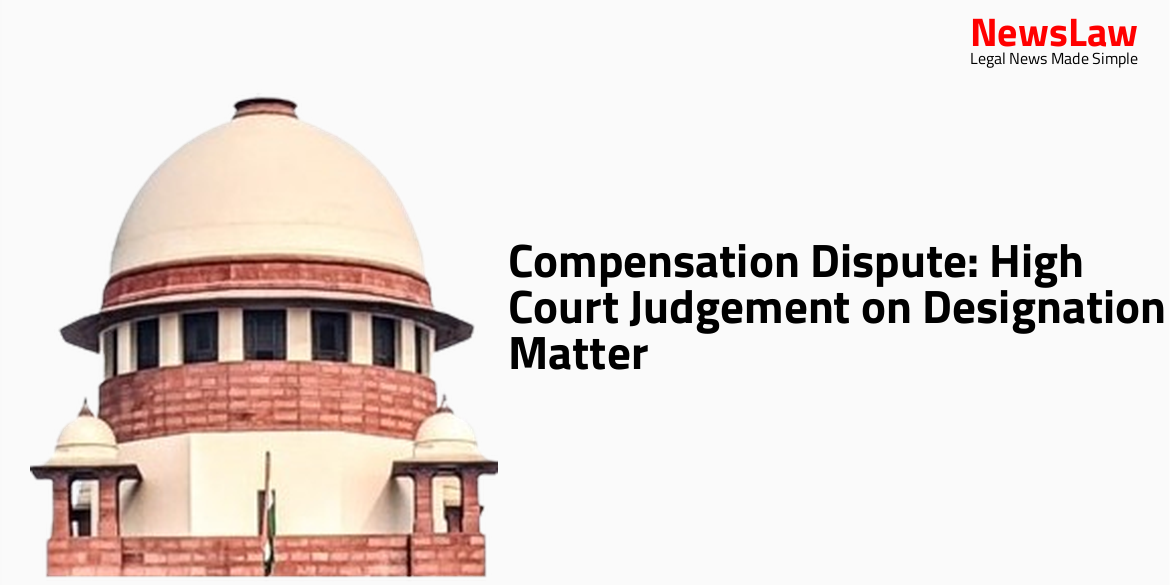In a significant legal development, the Supreme Court of India has delivered a crucial judgment in the case of Sundew Properties Ltd. v. TSERC & APTEL. The case pertained to the imposition of Fuel Adjustment Charges (FAC) by the electricity distribution licensee. Stay informed about this landmark ruling by following our blog for detailed analysis and implications of this decision on the Indian electricity regulatory framework.
Facts
- The Appellate Tribunal for Electricity (APTEL) considered the appeal filed under section 125 of the Indian Electricity Act, 2003.
- The issue under consideration was related to the Fuel Adjustment Charges (FAC) imposed by the electricity distribution licensee.
- The Appellate Tribunal reviewed the arguments presented by both the appellant and the respondent.
- APTEL analyzed the relevant provisions of the Electricity Act and previous precedents to arrive at a decision.
- The Tribunal provided detailed reasoning for its decision regarding the imposition of FAC by the electricity distribution licensee.
- The parties involved were given the opportunity to present their case and were heard by the Tribunal.
- APTEL’s decision on the FAC issue was based on a thorough examination of the facts and legal aspects involved in the case.
- The TSERC and APTEL erred by not acknowledging that a developer of an SEZ is automatically deemed to be a distribution licensee under section 14(b) of the Electricity Act.
- The status of a deemed distribution licensee is granted without the need for a separate license application, according to the SEZ Act, and is not dependent on specific rules or regulations.
- The appellant already holds the status of a deemed distribution licensee as per the 2010 Notification, and this has been acknowledged by both the TSERC and APTEL.
Also Read: High Court Judgment on Renewal of Mining Leases: State of Odisha vs. Thakurani Global Processors
Issue
- The next issue to be considered is whether Mr. John Smith, the petitioner, has followed the guidelines laid out in Rule 12.
- The compliance of the provisions of Rule 12 by Mr. John Smith needs to be assessed.
- This involves evaluating if the petitioner has adhered to the requirements and regulations outlined in Rule 12.
Also Read: Arvind Kejriwal vs. Directorate of Enforcement: Interim Bail Granted by Supreme Court of India
Arguments
- APTEL erred by agreeing with TSERC’s reasoning that the requirement to infuse Rs. 26.90 crore in equity was imposed on the appellant under section 16 of the Electricity Act
- APTEL recognized the appellant as a deemed distribution licensee but still upheld the requirement imposed on them
- a) The appellant, a SEZ developer, may be granted the status of a deemed licensee, but the 2005 Rules and 2013 Regulations will still be applicable as per the precedent set in Sesa Sterlite Limited v. Orissa Electricity Regulatory Commission and others.
- b) The appellant cannot be deemed a distribution licensee without making a formal application under regulation 13.
- c) The need for a harmonious interpretation of the SEZ Act and the Electricity Act to ensure compliance with both enactments, disallowing the appellant from claiming exemption from the 2005 Rules and 2013 Regulations.
- d) TSERC retains the power to impose both general and specific conditions at its own discretion.
Also Read: Bank Staff Unions vs. CBDT: Clarification on Taxation of Perquisites
Analysis
- The TSERC and the APTEL are in agreement that Rule 3(2) of the 2005 Rules applies to a SEZ developer recognized as a deemed distribution licensee under the proviso to section 14(b) of the Electricity Act read with regulation 13 of the 2013 Regulations.
- The TSERC’s reliance on regulation 49 of the 2013 Regulations to enforce the applicability of regulation 12 appears to be flawed.
- The primary legislation, the Electricity Act, confers deemed licensee status upon SEZ developers without imposing specific conditions.
- The 2013 Regulations clearly distinguish between different categories of licensees, defining an applicant seeking a license separately from a deemed distribution licensee seeking recognition.
- Regulation 12 solely pertains to regular distribution licensees and not to deemed licensees.
- The status of a deemed licensee under the 2013 Regulations does not require compliance with rule 3(2) of the 2005 Rules read with regulation 12.
- The judgment in Sesa Sterlite Limited does not establish that deemed distribution licensees must meet the criteria applicable to regular distribution licensees.
- The interpretation of regulation 12 to impose additional capital requirements on deemed licensees is inconsistent with the language and intent of the 2013 Regulations.
- The harmonious construction of the SEZ Act and the Electricity Act is emphasized by the respondents, but the appellant argues that the 2010 Notification grants deemed licensee status independently.
- Regulation 12’s application does not extend to applicants who are already deemed licensees under the 2013 Regulations.
- SEZ developer is deemed to be a distribution licensee under the Electricity Act, as per the proviso in section 14(b).
- TSERC’s imposition of additional capital infusion condition is deliberated upon in the judgment.
- Regulation 12 and Rule 3 of the 2005 Rules are mentioned in relation to the grant of distribution license.
- M/s. Sundew Properties Ltd. is identified as a deemed licensee by the [Commission].
- Definition of ‘deemed licensee’ in Regulation 2(i)(h) of the 2013 Regulations is provided.
- Section 14 of the Electricity Act outlines the grant of license and criteria for determining deemed licensees.
- The court must ascertain the purpose and scope of a statutory fiction when interpreting a statute.
- The deeming fiction in the proviso to section 14(b) of the Electricity Act is intended to confer a specific status to entities like the appellant.
- Legislators and non-legislators may not be treated differently when considering statutory fictions.
- The literal rule of interpreting a statute should aim to clarify its provisions without altering its fundamental character.
- Reading up a provision is justified when it aligns with legislative intent and does not contradict the original context of the law.
- Greater caution is required when reading up subordinate legislation to ensure it remains consistent with primary legislation.
- Reading up a provision can lead to judicial activism and should be done sparingly to prevent overreach.
- Rule 3(2) of the 2005 Rules, requiring an additional capital infusion of Rs. 26.90 crore, is deemed unjustified and contrary to the statutory scheme.
- The term ‘general conditions’ in regulation 49 is limited to Chapter-4 and does not extend to regulation 12 in Chapter-3 of the 2013 Regulations.
- Being a SEZ developer under the 2010 Notification does not automatically grant deemed licensee status; an application in line with the 2013 Regulations is necessary.
- The appellant has fulfilled the requirement by obtaining deemed licensee status through an application process as per rule 13 of the 2013 Regulations.
Decision
- The order of the TSERC is modified to exclude the condition of infusing additional capital by the promoters of the appellant
- The appellant is granted the status of a deemed licensee without the condition mentioned
- The appeal is partly allowed with no costs incurred
- The judgments and orders of the TSERC and the APTEL are set aside to this extent
- The first issue is answered accordingly
Case Title: M/S SUNDEW PROPERTIES LIMITED Vs. TELANGANA STATE ELECTRICITY REGULATORY COMMISSION (2024 INSC 439)
Case Number: C.A. No.-008978 – 2019



